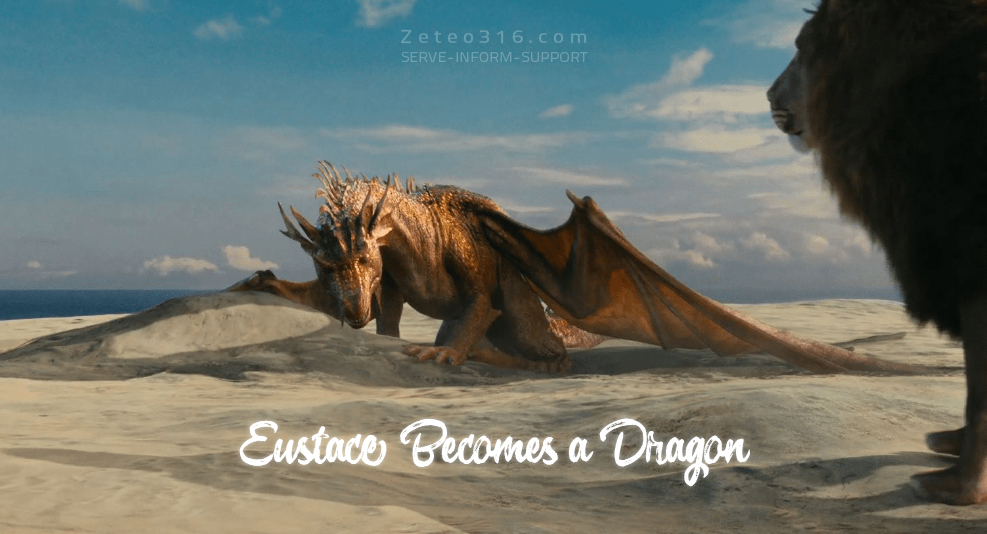
Eustace Clarence Scrubb was a character from C. S. Lewis’ Narnian Chronicles. He was the Pevensie children’s rotten little cousin – the sort of kid one doesn’t like having around. He’s introduced to us at the start of The Voyage of the Dawn Treader where we find him mercilessly taunting Lucy and Edmund Pevensie. Later on in the story, Eustace becomes a dragon.
When the ship drops anchor in a smooth-clear bay of a strangely silent mountainous island, Eustace wanders off by himself in order to avoid helping the crew repair storm damages to the vessel. Previously he’d spent all his time on the ship being a general nuisance and keeping records of his gripes in a personal diary.
Eustace Scrubb takes a hike up a steep mountain where he can see the Dawn Treader in the bay far below. After a long sleep, he wakes up surrounded by fog. His paranoia leads him to suspect the others may deliberately sail off without him. In a panic to return to the ship, he slides into a deep, narrow valley where he observes the last moments of a dying dragon.
After the death of the dragon there’s a sudden downpour of rain. Scrubb seeks shelter in a cave containing fabulous treasure. He greedily stuffs his pockets with jewels and places a (cursed) golden bracelet around his upper arm. Unable to find a way out of the steep valley, he goes to sleep. When Scrubb wakes up, he discovers that he’s become a dragon. His dragonish hunger even drives him to eat the remains of the dead dragon!
Dragon-Eustace flies out of the valley and he manages to make himself known to the others. The next few days are transformative for Eustace – not only does he receive sympathy, a former enemy becomes a great consoler, and he discovers the joy of being useful to the others.
As the repairs to the ship are finalized, and the time to set sail arrives, the problem of what to do with Eustace is addressed. The dragon is too large for the ship. As several ideas are discussed, Eustace suddenly realizes just how much of a nuisance he’s been all along.
It is the Christ-figure Aslan the Lion who un-dragons Eustace. Aslan leads Scrubb to a large round marble bath and tells him to undress. As much as Dragon-Eustace tries to scratch off his old skin, he remains a dragon. After three failed attempts, the Lion tells Eustace: “You will have to let me undress you.” Aslan succeeds where Eustace failed.
Not only has Eustace been un-dragoned, he’s forever changed. There are times when elements of his old character return, yet he continues to grow in grace. We find his character fighting alongside the besieged Narnians in the final eschatological installment, The Last Battle.
The story of Eustace’s redemption is thick with Christian metaphor. We can’t save ourselves; it is only Christ who can save us. Scrubb is one of my favorite characters in the Narnian Chronicles. I guess I strongly identify with him.
To this day I’m unable to satisfactorily articulate the two-week spiritual torment preceding my departure from the New Age. Nor can I express properly the joy following that departure. The best I can say is that it was like the lifting of an immense weight off my shoulders.
Like Eustace, elements of my old self resurface now and again. Despite this I’m comforted by the fact that it was Christ who hunted me down after years of being lost. Jesus loves us more than we can ever hope to love Him (Psalm 25:6; Psalm 136; Eph 2:1-7). Therefore He won’t let me go:
For I am convinced that neither death, nor life, nor angels, nor principalities, nor things present, nor things to come, nor powers, nor height, nor depth, nor any other created thing, will be able to separate us from the love of God, which is in Christ Jesus our Lord. Rom 8:38-39
From The Sands of Time are Sinking:
O Christ, He is the fountain,
The deep, sweet well of love!
The streams on earth I’ve tasted,
More deep I’ll drink above:
There to an ocean fullness
His mercy doth expand,
And glory, glory dwelleth
In Immanuel’s land.
Maranatha!
